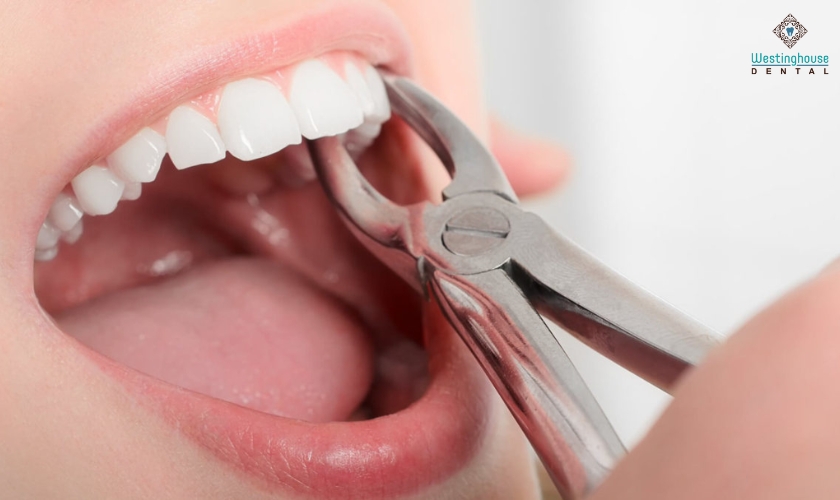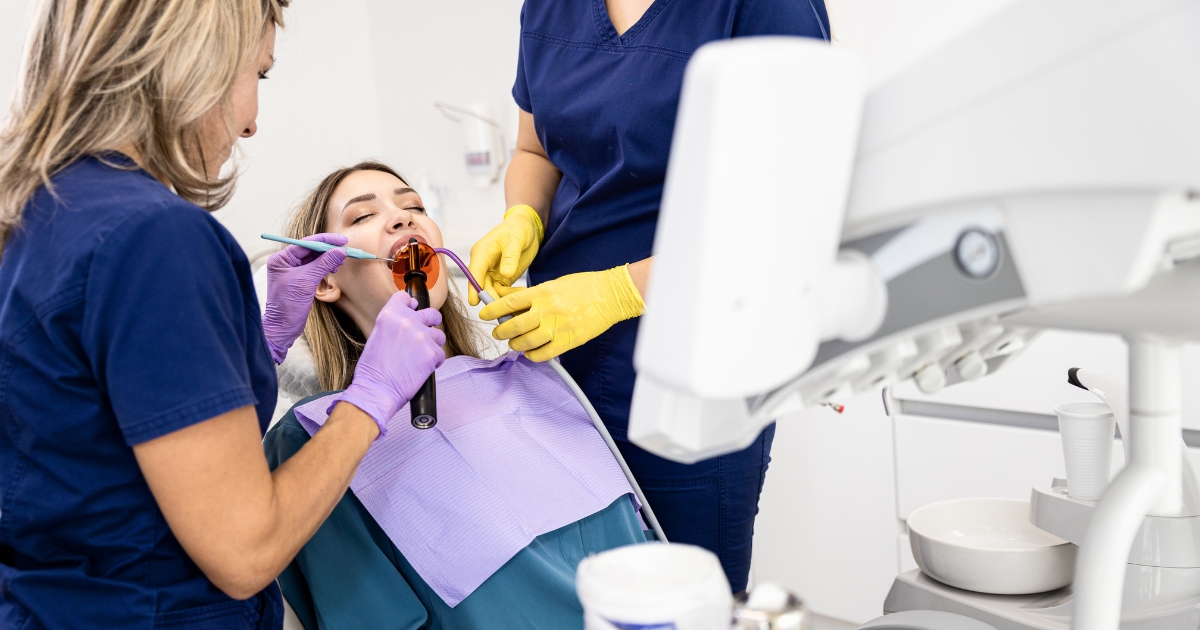$99 New Patient Special - Includes Exam, X-Ray and Basic Cleaning
How Do You Calm Down Before Tooth Extraction?

Facing a tooth extraction can be daunting for many individuals. Whether you feel fear or anxiety about the procedure or worry about discomfort, it’s natural to feel apprehensive. However, several strategies can help calm your nerves and reduce anxiety. In this comprehensive guide, we will explore various techniques and coping strategies for managing stress before tooth extraction. These approaches will allow you to approach the procedure with greater confidence and peace of mind.
Understanding Dental Anxiety:
Dental anxiety is a common phenomenon that affects millions worldwide. It can manifest as fear, nervousness, or apprehension about visiting the dentist or undergoing procedures. For some, the fear of pain or discomfort during treatment may be the primary source of anxiety. Others may feel anxious about the sounds, smells, or sensations associated with dental care.
It’s essential to recognize that dental anxiety is a valid response to the unfamiliar and uncomfortable nature of procedures. However, allowing this anxiety to go unchecked can lead to avoiding necessary dental care. This avoidance can ultimately compromise your oral health and exacerbate existing dental issues.
Strategies for Calming Down Before Tooth Extraction:
Fortunately, there are several strategies and techniques that can help alleviate anxiety and promote relaxation before a tooth extraction. By implementing these strategies before your appointment, you can better manage your anxiety and approach the procedure with a greater sense of calm and control.
1. Communicate with Your Dentist:
Open and honest communication with your dentist is key to managing anxiety before a tooth extraction. Don’t hesitate to voice your concerns and fears to your dentist, as they can provide reassurance, answer any questions you may have, and offer strategies for managing anxiety during the procedure.
Your dentist can adjust their approach or provide additional measures, such as sedation dentistry options, to help you feel more comfortable during the extraction. Knowing you have a supportive and understanding dental team can significantly reduce anxiety and instill confidence before the procedure.
2. Educate Yourself About the Procedure:
Fear of the unknown can contribute to dental anxiety, so take the time to educate yourself about the tooth extraction process. Ask your dentist to walk you through the procedure step by step, explaining what to expect before, during, and after the extraction. Understanding the process and knowing what to anticipate can help demystify the procedure and reduce anxiety.
You can also research reputable sources online or watch videos that demonstrate tooth extraction procedures. However, be mindful of sensationalized or overly graphic content that may increase anxiety rather than alleviate it. Stick to reliable sources and focus on obtaining accurate information that will help you feel more prepared and informed.
3. Practice Relaxation Techniques:
Incorporating relaxation techniques into your daily routine can help reduce overall anxiety levels and promote a sense of calmness before your tooth extraction appointment. Some effective relaxation techniques include:
- Deep breathing exercises: Practice slow, deep breathing to activate the body’s relaxation response and reduce stress. Inhale deeply through your nose for a count of four, hold for a count of four, and exhale slowly through your mouth for a count of four. Repeat this cycle several times until you feel more relaxed and centered.
- Progressive muscle relaxation: Tense and relax each muscle group in your body sequentially, starting from your toes and working your way up to your head. Focus on releasing tension and letting go of stress with each muscle group you relax.
- Visualization: Close your eyes and imagine yourself in a peaceful and calming environment, such as a serene beach or a tranquil forest. Visualize yourself feeling calm, relaxed, and confident as you prepare for your tooth extraction appointment.
- Mindfulness meditation: Practice mindfulness meditation to cultivate present-moment awareness and reduce anxious thoughts and feelings. Focus on the sensations of your breath, the sounds around you, and the sensations in your body, allowing any anxious thoughts to come and go without judgment.
4. Seek Support from Loved Ones:
Don’t hesitate to reach out to friends or family members for support and encouragement before your tooth extraction appointment. Sharing your feelings and concerns with trusted loved ones can help alleviate anxiety and provide a sense of reassurance and emotional support.
Consider asking a friend or family member to accompany you to your appointment for moral support. Having someone by your side can help distract you from anxious thoughts and provide comfort during the procedure. Just knowing that you’re not alone can make a significant difference in how you feel before and during the extraction process.
5. Distract Yourself with Relaxing Activities:
Engaging in relaxing activities can help take your mind off of any pre-extraction anxiety and promote a sense of calmness and well-being. Consider incorporating activities such as:
- Listening to calming music or nature sounds
- Reading a book or magazine
- Watching a funny or uplifting movie or TV show
- Engaging in a hobby or creative outlet, such as drawing, painting, or knitting
- Taking a warm bath or shower
- Spending time outdoors in nature
Choose enjoyable and soothing activities in the days leading up to your tooth extraction appointment. Focusing on activities that bring you joy can help reduce stress and anxiety. This approach cultivates a more positive mindset before the procedure. Make time for these activities to promote relaxation and well-being.
6. Practice Self-Care and Prioritize Sleep:
Taking care of your physical and emotional well-being is essential for managing anxiety before a tooth extraction. Make self-care a priority in the days leading up to your appointment by:
- Getting plenty of restful sleep: Aim for seven to nine hours of quality sleep per night to help your body and mind recharge and rejuvenate. Establish a relaxing bedtime routine and create a comfortable sleep environment to promote restful sleep.
- Eating a balanced diet: Fuel your body with nutritious foods that support overall health and well-being. Avoid excessive caffeine and sugar, which can exacerbate anxiety and disrupt sleep.
- Staying hydrated: Drink plenty of water throughout the day to stay hydrated and support optimal bodily functions. Dehydration can exacerbate feelings of stress and anxiety, so be sure to prioritize hydration leading up to your tooth extraction appointment.
- Engaging in physical activity: Incorporate regular exercise into your routine to help reduce stress and anxiety, boost mood, and promote overall well-being. Choose activities that you enjoy, such as walking, yoga, or swimming, and aim for at least 30 minutes of moderate exercise most days of the week.
By practicing self-care and prioritizing your physical and emotional health, you can better manage anxiety and approach your tooth extraction appointment feeling more grounded, resilient, and prepared.
7. Explore Sedation Dentistry Options:
For individuals with severe dental anxiety or phobia, sedation dentistry may be a viable option. This approach helps manage anxiety and discomfort during tooth extraction procedures. Sedation dentistry uses medication to induce relaxation and calmness. It allows patients to undergo dental treatment comfortably and without fear.
There are several types of sedation dentistry available, ranging from mild to moderate to deep sedation, depending on the individual’s needs and preferences:
- Nitrous oxide (laughing gas): Nitrous oxide is a mild form of sedation that is administered through a mask worn over the nose. It induces feelings of relaxation and euphoria, allowing patients to remain conscious and responsive during the procedure while feeling more at ease.
- Oral sedation: Oral sedation involves taking a prescription medication, such as a benzodiazepine, before the dental appointment to induce a state of relaxation and drowsiness. Oral sedation can help reduce anxiety and discomfort during the procedure, and patients may have limited recollection of the experience afterward.
- Intravenous (IV) sedation: IV sedation involves administering sedative medication directly into the bloodstream through a vein in the arm. This form of sedation induces a deeper level of relaxation and may be suitable for individuals with moderate to severe dental anxiety or those undergoing more complex procedures.
Before considering sedation dentistry, it’s essential to discuss your options with your dentist or oral healthcare provider. They can evaluate your individual needs and preferences, review your medical history, and recommend the most appropriate sedation option for your situation.
8. Practice Positive Affirmations and Visualization:
Harnessing the power of positive thinking and visualization can help shift your mindset from one of fear and anxiety to one of confidence and calmness. Incorporate positive affirmations and visualization techniques into your daily routine to help reframe negative thoughts and promote a more positive outlook.
Repeat affirmations such as “I am calm and relaxed,” “I trust my dentist to provide safe and effective care,” or “I am capable of handling this procedure with grace and resilience.” Visualize yourself going through the tooth extraction process calmly and confidently, envisioning a positive outcome and a smooth recovery.
By focusing on positive affirmations and visualizations, you can help quiet anxious thoughts and cultivate a more optimistic mindset leading up to your tooth extraction appointment.
9. Consider Therapeutic Interventions:
In addition to self-help strategies and relaxation techniques, therapeutic interventions can also help. Cognitive-behavioral therapy (CBT) and mindfulness-based stress reduction (MBSR) may be beneficial. These approaches manage dental anxiety and promote relaxation before a tooth extraction.
CBT is a form of psychotherapy that identifies and challenges negative thought patterns contributing to anxiety. It helps replace these thoughts with more adaptive and rational ones. Individuals learn coping skills and strategies to manage anxious thoughts and behaviors. This approach helps develop greater resilience and confidence in facing dental procedures.
MBSR is a mindfulness-based intervention that combines mindfulness meditation, body awareness, and gentle movement to reduce stress and promote relaxation. By cultivating present-moment awareness and nonjudgmental acceptance of thoughts and sensations, individuals can learn to respond to dental anxiety with greater calmness and equanimity.
Consider seeking guidance from a licensed mental health professional who specializes in anxiety or stress management to explore therapeutic interventions that may be helpful for you. They can provide personalized support and guidance tailored to your unique needs and circumstances.
Navigating Anxiety and Stress Before Tooth Extraction
Facing a tooth extraction can evoke feelings of fear and anxiety for many individuals. However, you can manage these emotions effectively. By implementing the strategies in this guide, you can reduce anxiety and stress. This preparation allows you to approach the procedure with greater confidence and calmness.
From open communication with your dentist and practicing relaxation techniques to exploring sedation dentistry options and engaging in therapeutic interventions, there are numerous tools and resources available to help alleviate anxiety and promote a positive dental experience. Remember that dental anxiety is common and understandable, and there is no shame in seeking support or assistance to help you navigate your fears and concerns.
Prioritize your emotional well-being and practice self-care before your tooth extraction. Enlist the support of trusted loved ones. Healthcare professionals can also help you manage anxiety and stress. These proactive steps promote a smoother and more comfortable dental experience. They support your overall oral health and well-being. If you have questions about your procedure, reach out to your dentist. Don’t hesitate to ask for guidance and support. With the right strategies, you can approach your extraction with confidence. This preparation helps you care for your dental health effectively.
Looking For Dentist in Georgetown, TX
We are here to help you and support you with all of your oral health needs. If you think you could have dental problems, call our Georgetown Dentist office today. We are always happy to answer any questions you have . Schedule an appointment now.





